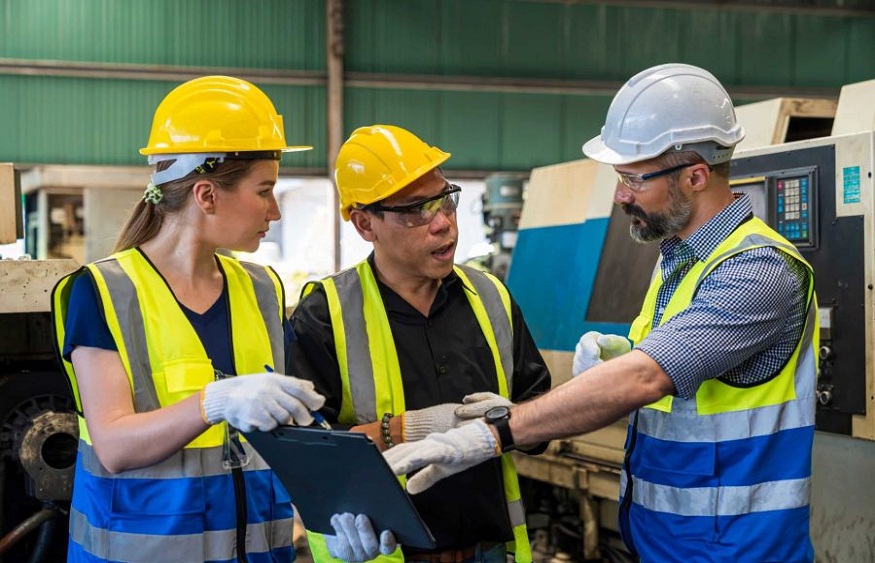 In the industrial sector, where heavy machinery, complex processes, and hazardous materials are standard, ensuring the safety and well-being of employees is paramount. As industries evolve, so too do the associated risks, making it essential for organizations to prioritize safety. One effective way to achieve this is through Industrial Safety Certificate Programs. These certifications play a crucial role in not only safeguarding employees but also in fostering a culture of safety that enhances overall well-being. In this blog, we will explore the impact of safety training on employee well-being and why safety certification courses are indispensable in today’s workplace.
In the industrial sector, where heavy machinery, complex processes, and hazardous materials are standard, ensuring the safety and well-being of employees is paramount. As industries evolve, so too do the associated risks, making it essential for organizations to prioritize safety. One effective way to achieve this is through Industrial Safety Certificate Programs. These certifications play a crucial role in not only safeguarding employees but also in fostering a culture of safety that enhances overall well-being. In this blog, we will explore the impact of safety training on employee well-being and why safety certification courses are indispensable in today’s workplace.
1. Building a Safety-First Culture
Industrial safety certifications are designed to instill a safety-first mindset within an organization. When employees undergo these certification programs, they gain a deep understanding of safety protocols, risk management, and emergency response procedures. This knowledge empowers them to recognize potential hazards and proactively prevent accidents. As a result, a safety culture permeates the workplace, where every employee is committed to maintaining a safe environment for themselves and their colleagues. This collective responsibility reduces the likelihood of accidents and contributes to a sense of security and employee well-being among the workforce.
2. Reducing Workplace Accidents
One of the most tangible benefits of industrial safety certification is reducing workplace accidents. Certified employees are better equipped to identify risks, follow safety protocols, and respond effectively in emergencies. This leads to fewer incidents, reducing employees’ physical and emotional toll. When workers feel confident in their safety training and trust that their organization prioritizes their well-being, they are likelier to perform their duties with peace of mind. This assurance enhances their overall job satisfaction and reduces stress, contributing to their long-term well-being.
3. Enhancing Employee Confidence and Competence
Safety certification courses often include practical training and assessments that help employees develop the skills to manage safety effectively. This hands-on experience boosts their confidence in handling safety-related tasks and reinforces their competence in the workplace. Employees who feel confident in their abilities are likelier to take initiative, engage in problem-solving, and contribute to a safer work environment. This sense of empowerment is crucial for employee well-being, as it fosters a positive attitude towards work and promotes a strong sense of professional fulfillment.
4. Promoting Health and Well-being Beyond the Workplace
The benefits of industrial safety certification extend beyond the workplace, influencing employees’ overall health and well-being. Certified employees are more aware of the importance of safety in all aspects of their lives, including at home and in public spaces. The knowledge and skills they acquire during safety certification courses can be applied to various situations, helping them protect themselves and their loved ones from potential hazards. This holistic approach to safety contributes to their well-being, ensuring they are better prepared to navigate everyday risks.
5. Boosting Morale and Job Satisfaction
When employees see that their organization invests in their safety through certification programs, it conveys that their well-being is valued. This recognition fosters a sense of loyalty and commitment to the company, boosting morale and job satisfaction. Employees who feel valued are more likely to stay with the organization, reducing turnover rates and contributing to a stable and engaged workforce. Additionally, a positive work environment where safety is prioritized can attract top talent, further enhancing the organization’s success.
6. Ensuring Compliance with Industry Standards
Industrial safety certifications are often aligned with industry standards and regulations. By ensuring that employees are certified, organizations demonstrate their commitment to complying with these standards, which is essential for avoiding legal issues and maintaining a good reputation. Compliance protects the organization and safeguards employees by ensuring that they work in environments that meet the highest safety standards. This compliance is key in creating a workplace where employees feel secure and well-cared-for, enhancing their overall well-being.
7. Supporting Continuous Improvement
Industrial safety is not a one-time effort but a continuous process of improvement. Certification programs often include ongoing training and recertification requirements, ensuring employees stay updated with the latest safety practices and technologies. This commitment to continuous improvement benefits both the organization and its employees. It keeps safety practices relevant and effective, reducing the risk of accidents and promoting a culture of learning and growth. For employees, continuous learning opportunities contribute to their professional development and ensure they remain competent and confident in their roles.
Empowering Employees Through Tata Steel Industrial Consulting (TSIC)
Organizations like Tata Steel have taken proactive steps to support their employees’ ongoing safety and well-being through specialized training programs offered by Tata Steel Industrial Consulting (TSIC). TSIC is a cornerstone of Tata Steel’s commitment to employee development, offering a wide range of courses tailored to the steel industry.
Here’s how TSIC contributes to a safer and more knowledgeable workforce:
- Accessible Learning: Courses are designed to be integrated smoothly with operational demands, ensuring that learning does not disrupt workflow.
- Expert-Led Content: TSIC’s courses are designed and delivered by industry experts, ensuring that employees receive high-quality and relevant education.
- Comprehensive Coverage: TSIC’s course offerings cover various topics, from technical skills to safety management and leadership development. This includes health and safety courses, ensuring employees are well-versed in safety and professional development.
By integrating TSIC into their operations, organizations can ensure that their workforce is continuously evolving, well-informed, and prepared to meet the challenges of a dynamic industrial environment.
Conclusion: The Power of Safety Certification
Industrial safety certification is more than a formal requirement; it is a powerful tool for enhancing employee well-being. By building a safety-first culture, reducing workplace accidents, boosting confidence, and promoting health beyond the workplace, these certifications contribute significantly to the overall well-being of employees. Furthermore, safety certifications help create a work environment where employees feel valued, secure, and motivated by ensuring compliance with industry standards and supporting continuous improvement.
Organizations that prioritize industrial safety certification protect their workforce and invest in their long-term success. Safe and well employees are more productive, engaged, and loyal, driving the organization towards excellence. Tata Steel Digie-Shala offers a robust platform to help achieve these goals. With its comprehensive and accessible courses, including TSIC premium programs, Digie-Shala is paving the way for a safer, more knowledgeable industrial workforce.





